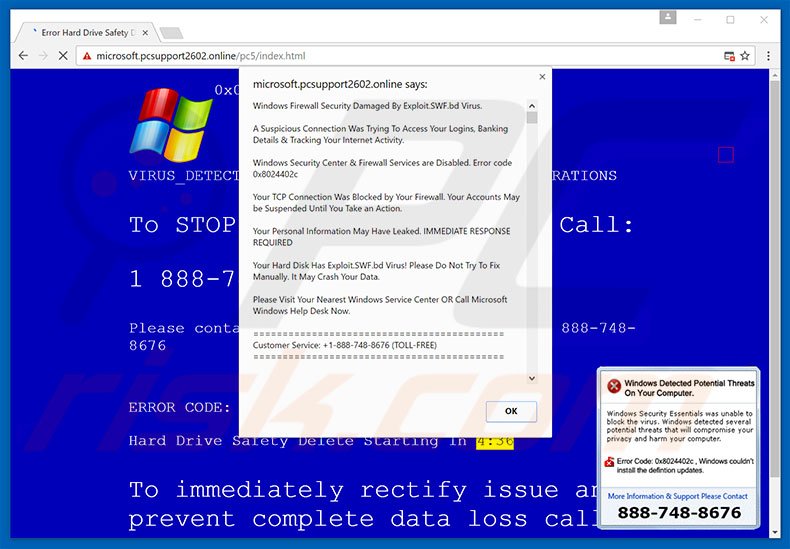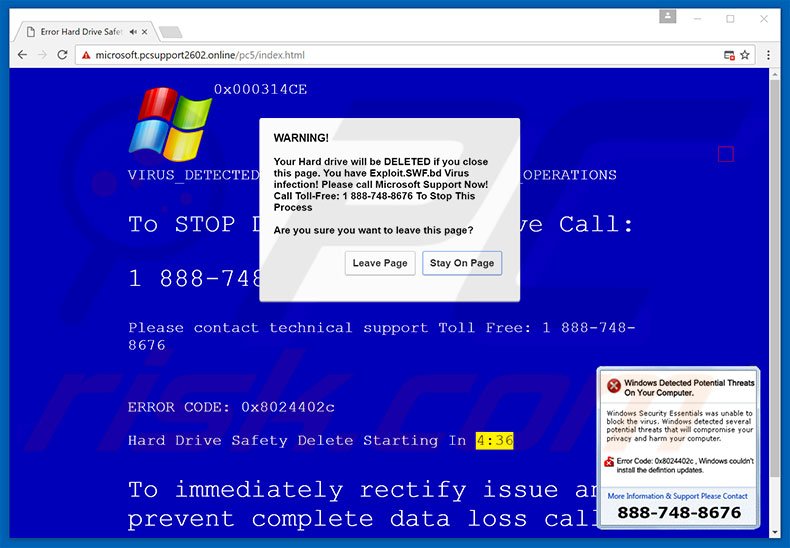Windows Firewall Security Damaged Scam
AdwareAlso Known As: Windows Firewall Security Damaged virus
Get free scan and check if your device is infected.
Remove it nowTo use full-featured product, you have to purchase a license for Combo Cleaner. Seven days free trial available. Combo Cleaner is owned and operated by RCS LT, the parent company of PCRisk.com.
What is Windows Firewall Security Damaged?
"Windows Firewall Security Damaged" is a fake error message displayed by a malicious website. Users are redirected to this website by potentially unwanted adware-type programs (PUPs). These apps often infiltrate systems during installation of free software (bundling method).
Following infiltration, adware collects information relating to web browsing activity, delivers intrusive online advertisements, and, in this case, causes unwanted browser redirects.

"Windows Firewall Security Damaged" states that the computer is infected with an exploit kit and that this virus attempts to gather personal information (bank account details, information relating to web browsing activity, etc.) The error is displayed via a pop-up stating that closing it can result in deletion of the hard drive.
To solve the problem and remove the virus, victims must supposedly contact "Microsoft's technicians" immediately via a telephone number provided (1 888-748-8676). Be aware, however, that this is a scam - "Windows Firewall Security Damaged" is a fake error message.
Criminals attempt to scare and trick victims into paying for services (help removing the non-existent malware) that are not needed. Therefore, ignore this pop-up and never attempt to contact these people. As mentioned above, adware-type applications often deliver intrusive online ads.
These advertisements are displayed using a 'virtual layer' - a tool that enables placement of third party graphical content on any site. The ads often conceal underlying content of visited websites, thereby diminishing web browsing experience. Furthermore, some redirect to malicious websites - even accidental clicks can result in high-risk computer infections.
In addition, PUPs continually monitor users' web browsing activity by gathering various data including IP addresses, URLs visited, search queries, pages viewed, etc. The collected information might contain private details that adware developers share with third parties (potentially, cyber criminals) who misuse personal information to generate revenue.
Thus, data tracking can lead to serious privacy issues or even identity theft. Adware-type applications must be uninstalled immediately.
There are many scam errors similar to "Windows Firewall Security Damaged". Examples include This User Is Disabled, Microsoft Security Essentials Toll Free, and Microsoft Windows Is Not Genuine. All state that the system is infected, missing files, or damaged in other similar ways. To solve these problems, victims are encouraged to pay for 'services'.
In fact, these errors are fake - cyber criminals attempt to scam victims. The Internet is full of adware-type applications offering various 'useful features', however, rather than providing any real value, they collect private data (which is later sold to third parties) and deliver intrusive online ads (via the "Pay Per Click" advertising model).
Their only purpose is to generate revenue for the developers whilst regular users receive no significant value.
How did adware install on my computer?
Adware-type apps are often distributed using a deceptive marketing method called "bundling". Developers hide all bundled apps within the "Custom/Advanced" settings of the download or installation processes. Rushing this stage and and skipping steps exposes the system to risk of various infections.
How to avoid installation of potentially unwanted applications?
This situation can be prevented by taking two simple steps. Firstly, never rush when downloading and installing software. Select the "Custom/Advanced" settings and closely analyze each step. Secondly, decline offers to download/install additional apps and cancel those already included.
Text presented within the first pop-up:
Windows Firewall Security Damaged by Exploit.SwF.bd Virus.
A Suspicious Connection was trying to Access Your Logins, Banking Details & Tracking Your Internet Activity.
Windows Security Center & Firewall Services are Disabled. Error code 0x8024402c
Your TCP Connection Was Blocked by Your Firewall. Your Accounts May be Suspended Until You Take Action.
Your Personal Information May Have Leaked. IMMEDIATE RESPONSE REQUIRED.
Your Hard Disk Has Exploit.SWF.bd Virus! Please Do Not Try To Dix Manually. It May Crash Your Data.
Please Visit Your Nearest Windows Service Center OR Call Microsoft Windows Help Desk Now.
Customer Service 1-888-748-8676 (TOLL-FREE)
Screenshot of the second error pop-up:

Text presented within the second pop-up:
WARNING!
Your Hard drive will be DELETED if you close this page. You have Exploit.SWF.bd Virus infection! Please call Microsoft Support Now! Call Toll-Free: 1 888-748-8676 to Stop This Process
Instant automatic malware removal:
Manual threat removal might be a lengthy and complicated process that requires advanced IT skills. Combo Cleaner is a professional automatic malware removal tool that is recommended to get rid of malware. Download it by clicking the button below:
DOWNLOAD Combo CleanerBy downloading any software listed on this website you agree to our Privacy Policy and Terms of Use. To use full-featured product, you have to purchase a license for Combo Cleaner. 7 days free trial available. Combo Cleaner is owned and operated by RCS LT, the parent company of PCRisk.com.
Quick menu:
- What is Windows Firewall Security Damaged virus?
- How to identify a pop-up scam?
- How do pop-up scams work?
- How to remove fake pop-ups?
- How to prevent fake pop-ups?
- What to do if you fell for a pop-up scam?
How to identify a pop-up scam?
Pop-up windows with various fake messages are a common type of lures cybercriminals use. They collect sensitive personal data, trick Internet users into calling fake tech support numbers, subscribe to useless online services, invest in shady cryptocurrency schemes, etc.
While in the majority of cases these pop-ups don't infect users' devices with malware, they can cause direct monetary loss or could result in identity theft.
Cybercriminals strive to create their rogue pop-up windows to look trustworthy, however, scams typically have the following characteristics:
- Spelling mistakes and non-professional images - Closely inspect the information displayed in a pop-up. Spelling mistakes and unprofessional images could be a sign of a scam.
- Sense of urgency - Countdown timer with a couple of minutes on it, asking you to enter your personal information or subscribe to some online service.
- Statements that you won something - If you haven't participated in a lottery, online competition, etc., and you see a pop-up window stating that you won.
- Computer or mobile device scan - A pop-up window that scans your device and informs of detected issues - is undoubtedly a scam; webpages cannot perform such actions.
- Exclusivity - Pop-up windows stating that only you are given secret access to a financial scheme that can quickly make you rich.
Example of a pop-up scam:

How do pop-up scams work?
Cybercriminals and deceptive marketers usually use various advertising networks, search engine poisoning techniques, and shady websites to generate traffic to their pop-ups. Users land on their online lures after clicking on fake download buttons, using a torrent website, or simply clicking on an Internet search engine result.
Based on users' location and device information, they are presented with a scam pop-up. Lures presented in such pop-ups range from get-rich-quick schemes to fake virus scans.
How to remove fake pop-ups?
In most cases, pop-up scams do not infect users' devices with malware. If you encountered a scam pop-up, simply closing it should be enough. In some cases scam, pop-ups may be hard to close; in such cases - close your Internet browser and restart it.
In extremely rare cases, you might need to reset your Internet browser. For this, use our instructions explaining how to reset Internet browser settings.
How to prevent fake pop-ups?
To prevent seeing pop-up scams, you should visit only reputable websites. Torrent, Crack, free online movie streaming, YouTube video download, and other websites of similar reputation commonly redirect Internet users to pop-up scams.
To minimize the risk of encountering pop-up scams, you should keep your Internet browsers up-to-date and use reputable anti-malware application. For this purpose, we recommend Combo Cleaner Antivirus for Windows.
What to do if you fell for a pop-up scam?
This depends on the type of scam that you fell for. Most commonly, pop-up scams try to trick users into sending money, giving away personal information, or giving access to one's device.
- If you sent money to scammers: You should contact your financial institution and explain that you were scammed. If informed promptly, there's a chance to get your money back.
- If you gave away your personal information: You should change your passwords and enable two-factor authentication in all online services that you use. Visit Federal Trade Commission to report identity theft and get personalized recovery steps.
- If you let scammers connect to your device: You should scan your computer with reputable anti-malware (we recommend Combo Cleaner Antivirus for Windows) - cyber criminals could have planted trojans, keyloggers, and other malware, don't use your computer until removing possible threats.
- Help other Internet users: report Internet scams to Federal Trade Commission.
Share:

Tomas Meskauskas
Expert security researcher, professional malware analyst
I am passionate about computer security and technology. I have an experience of over 10 years working in various companies related to computer technical issue solving and Internet security. I have been working as an author and editor for pcrisk.com since 2010. Follow me on Twitter and LinkedIn to stay informed about the latest online security threats.
PCrisk security portal is brought by a company RCS LT.
Joined forces of security researchers help educate computer users about the latest online security threats. More information about the company RCS LT.
Our malware removal guides are free. However, if you want to support us you can send us a donation.
DonatePCrisk security portal is brought by a company RCS LT.
Joined forces of security researchers help educate computer users about the latest online security threats. More information about the company RCS LT.
Our malware removal guides are free. However, if you want to support us you can send us a donation.
Donate
▼ Show Discussion